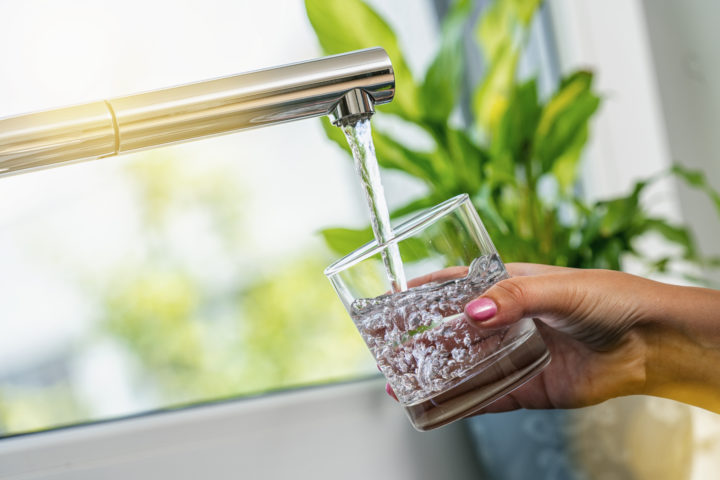
Chlorine and disinfectant taste and smells
This problem can occur when the plastic or rubber parts in appliances or fittings start to react with the low levels of chlorine in the water.
These plastic and rubber fittings are commonly found around the house and workplace in kettles (plastic and metal), pipes and flexible hoses connected to drinks machines, dishwashers and washing machines, and tap washers.
Chlorine
Chlorine in drinking water is not harmful, but some people are more sensitive to the taste and smell of chlorine than others. To help reduce the chlorinous taste and odour in the water try the following.
- Fill a jug with cold water and place in the fridge for a few hours before use.
- This will allow some of the chlorine to disperse and in a few hours the taste or odour will improve.
- The jug should be covered and any water left after 24 hours should be discarded
More details are available by downloading IWNL’s Chlorine in your water advice leaflet.
TCP and disinfectant
If you have a washing machine or dishwasher, the hoses connecting your pipework and your appliance could be causing the taste. To find out if this is the cause, follow the below guidance.
- Firstly, isolate the supply to your appliance
- Next detach the appliance hose from the plumbing
- Now run the taps to flush out any water which has been in contact with the hoses.
- Finally, before you reconnect the hose, see if the taste has gone. If it has, then the hose is the cause.
More details are available by downloading IWNL’s TCP and disinfectant advice leaflet.
Earthy, musty or stale
These tastes and smells are often more noticeable first thing in the morning or when the property has been left for a period of time. Often the problem is coming from the waste trap in the sink rather than the water itself.
Running the tap can disturb waste in the waste trap or u-bend. Try cleaning the sink trap and drain to solve the problem or run you tap for a few minutes.
If this doesn’t work, it may be that there is low turnover of the water in the mains and we may need to flush the main to clear any water that is not being used promptly. Please contact us so that we can investigate.
More details are available by downloading IWNL’s Earthy, Musty or Stale Water Advice Leaflet.
Diesel and petrol
You should contact IWNL immediately if you find that your water tastes or smells of diesel or petrol. This taste or odour may be due to a fuel spill close to your home. The chemical compounds in diesel and petrol can penetrate the plastic pipes used to deliver water to your home. Therefore, please clean up any fuel spills that occur on your property.
Metallic and bitter
Metallic water – If water is allowed to stand in taps, plumbing or other appliances for long periods of time, metals from the pipework or appliances can leach into the water. Elevated levels of metals in water can cause some unusual tastes, odours and in some extreme cases, colour changes. Flushing of your pipework can quickly resolve these issues.
Salty
If your water tastes or smells salty, your water softener (if present) may not be working properly.
Please contact an approved plumber to fix or replace your water softener (www.watersafe.co.uk). Water softeners typically need to be replaced after 10-20 years.
Sewerage
A sewage taste or smell is most likely to be the smell of a blocked drain, rather than anything more worrying.
There is a quick test you can do to work out where it’s coming from.
- Fill a glass with water from the tap where you’ve noticed the smell or taste of sewage.
- Take that glass of water into another room in your home.
- Smell or taste the water again to check if the smell or taste clears.
- If it does clear, this would suggest that the smell is coming from a sink or drain, rather than the water itself. In that case you can use household drain cleaning products to clear or unblock the drain, which should solve the problem.
If the smell or taste is still present, you should contact us immediately.
Sulphur
If your water smells like sulphur, this normally results from a build-up of organic matter in your pipes and is typically nothing to worry about. It may indicate that there may be an increased level of hydrogen sulphide in your water supply which, in most cases, does not indicate any threat to your health.
A simple check to see if your water is compromised is to:
- Fill a glass with cold water
- Walk away from your sink, and smell the water.
- If the smell is no longer pungent, then your pipework is causing the smell and needs to be cleaned.
- If you can no longer smell sulphur, please flush your tap before drinking water directly from it.
Repeat for your hot water tap.
Once away from the sink, if the water smells of sulphur, this may be an issue with your boiler. Please contact an approved boiler specialist to investigate.
